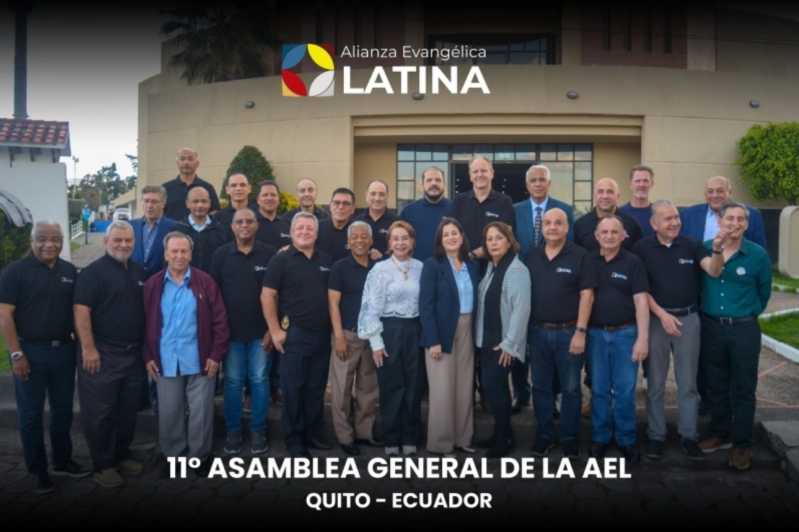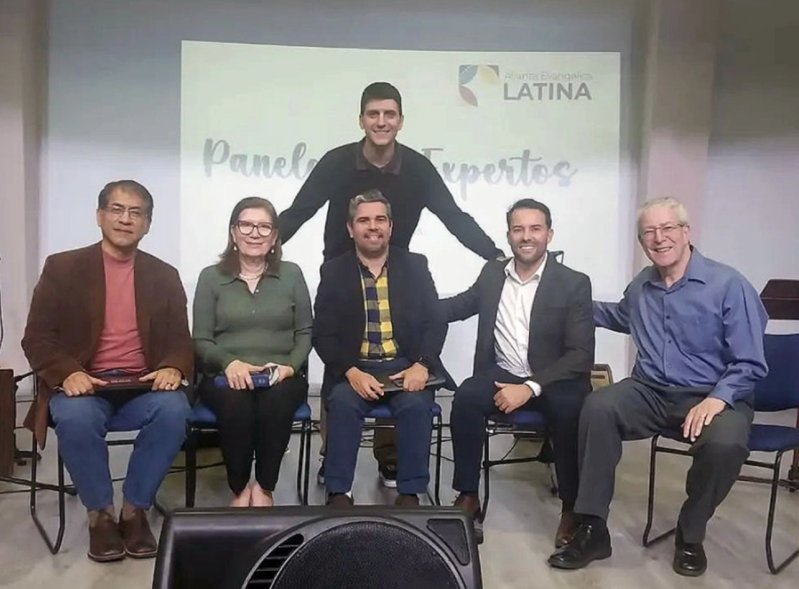
During the 11th General Assembly of the Alianza Evangélica Latina (Latin Evangelical Alliance, AEL) held in Quito, Ecuador from October 14 to 18, the evangelical organization celebrated its 11 years of existence, which included an evaluation of the accomplishments over the past years and looking ahead into the future. As an intercontinental alliance of churches, AEL affirmed its purpose to unite and speak on behalf of its constituency.
Representing 22 nations of the American continent and Spain, the members of AEL issued the 'Declaration of Quito', which speaks about the “call to build bonds of unity that encourage cooperation and collaboration among the churches and believers of our countries, with a specific emphasis on solidarity with those who are going through difficult or complicated situations. Our purpose is to synergize efforts to achieve more effective results in the mission entrusted to us.”
During the annual assembly, they evaluated the previous years and envisioned what steps to take in the near future in terms of fellowship, collaboration and unity. Executive Director Pastor Jonatan Proietti expressed his enthusiasm when speaking exclusively to Diario Cristiano, Christian Daily International's Spanish edition, saying that “the AEL has become the most representative alliance of evangelicals in the region.” It is now in the eleventh year of existence and has an active presence in the 22 countries including the representation of Spain, which is why it is considered an intercontinental alliance, he said.
“In the last Assembly, we had panels where presidents or vice presidents of the national alliances, or international speakers talked about the challenges, barriers and paradigms that the Church needs to break through or change,” explained Proietti. “We talked about information, information management, artificial intelligence management, evangelism and discipleship, as two oars of the same boat that move the Church forward. Envisioning growth and maintaining the growth of Latin America.”
AEL President Pastor Juan Cruz Cellammare also exclusively told Diario Cristiano that “three stages have passed” since the foundation of the young alliance. He described them as “the foundation, the shaping and now we are in the stage of the sense of belonging.”
“We see that the member countries of the AEL assume the role of being owners of the Alliance. The 22 countries, the associated entities as well, that is why this year was unity, working on the unity of the alliances with the churches, unity and sense of belonging. This sense of belonging is knowing that we have a strong, consolidated, well represented AEL with significant numbers of churches at the international level through our full members,” he said.
AEL indicates that through its full members, it represents 247 million evangelicals and more than 500,000 churches throughout Ibero-America. The figure may seem ambitious but reveals the geographic reach and considers the evangelical population represented through the alliances or councils of churches in each country.
Proietti pointed out that the “AEL is also part of the World Evangelical Alliance where - according to what is recognized by the WEA itself - our alliance is one of the most influential. The AEL is also one of the alliances with the greatest growth and development worldwide.”
Cellammare commented that “we are able to make a solid alliance with a prophetic voice, with a voice of unity, with a relevant voice before international organizations, a voice that can share the growth of the Church, but also the needs of the Church.”

For Proietti, who is the youngest son of late Pastor Rubén Proietti, the former president of the alliance and one of the continental promoters of the unity of the Church, said “in terms of its external development, the influence of its representation, the recognition that American and international organizations have for the AEL is undeniable.”
“For example, the OAS has signed agreements with the AEL and has respect for and a close relationship [with us], and recognizes the significance of what we are and what we do. And internally, the AEL in recent years has worked out a strategic plan that will guide it for the coming years,” he said.
What AEL has become today represents what Proietti Sr. and other Hispanic American leaders hoped for when they first worked towards the creation of the AEL.
Jonathan Proietti believes that “the AEL is maturing in terms of its strategic plan, and has also matured its heart, its active arms, which are the 16 working commissions. Each of these 16 commissions are working, acting and operating, and a good part of these commissions are represented or formed by the majority of the 22 countries that make up the AEL. So, there is an active presence on the continent and in a good number of Euro-American countries. So, to speak of influence, to speak of internal and external strength, is to speak of a process that began and has not stopped, it continues into the future.”
Meanwhile, Cellammare stated that they are embarking on “a stage with a well-framed strategic plan. This strategic plan was approved at the ninth General Assembly in Punta Cana. It has been three years in the making and the result of a process that went on for at least seven or eight years.”
“Looking ahead at the years to come, the AEL is preparing itself,” said Proietti, explaining that they will ”deepen the influence and actions in a more intentional way. Especially from the commissions in the different areas, such as religious freedom, humanitarian affairs and cooperative dialogue, governmental relations, AEL women, AEL Youth, Evangelism, Children, Communications, Missions, Education, etc., to mention a few.”
In addition to the different discussion topics at the 11th Assembly that he mentioned at the beginning, the Executive Director of the AEL said that “of course, another emphasis for the coming years is the challenge of generational transition.”
The Alliance's strategic plan speaks about generational change, he said. “The transmission of the values that we are going to embrace as a Church are not new. I say this in the sense of refreshing and remembering the biblical values and principles that God left in his Word for the Church to develop.”
The goal of the AEL is to speak with a representative voice and identity as Latin evangelical churches. The AEL seeks to bring together the diversity of local churches represented by the Alliances and Councils and - after dialogue and finding agreement - speak as a united voice as AEL, he said.
“In summary, the years that passed put us on our feet. It started with a lot of enthusiasm, with a lot of leadership, little formality. Today we are at a moment of formalization, of structuring ourselves, of laying the foundations for the strong growth that we will surely see in the coming years. We trust in the multiplicity of gifts, knowledge and revelations that the Lord is giving us as spiritual leaders and as delegates, because that is what each and every one of us who are part of the executive of the AEL, of the different countries and their alliances of churches are,” he concluded.
Cellammare commented that he believes “that the AEL is heading in that direction. We already have the next two years marked with Assemblies in different countries. This also means that we have a roadmap well underway and the AEL is on its way to becoming a solid and sustainable organization. I believe that we are going to achieve this, thanks to God.”
The location and dates of the next two Assemblies were decided to be Colombia from September 8 to 12, 2025, and Costa Rica from October 12 to 16, 2026.
The Assembly was marked by camaraderie and fellowship, and together they sought guidance from God by delving into Scripture and celebrating the Lord's Supper together, confessing that everyone desires to be united as followers of Jesus.
As part of fulfilling the legal requirements of the organization, the assembly also saw the renewal of the Board of Directors, with the following elected officials: Pr. Juan Cruz Cellammare (President - Paraguay), Pr. Jorge Gómez Varela (Vice President 1 - Costa Rica), Pr. Louder Garabedián (Vice President 2 - Uruguay), Pr. Mariano Blázquez (Secretary - Spain), Pr. Nérsido Borg (Treasurer - Dominican Republic), Pr. Daniel Romero (Vocal 1 - Honduras), Pr. Eduardo Concha (Vocal 2 - Peru), Pr. Olgálvaro Bastos (Vocal 3 - Brazil), Pr. Eduardo Gómez (Vocal 4 - Colombia), Bishop Emiliano Soto (Vocal 5 - Chile), Pr. Christian Hooft (Vocal 6 - Argentina) and Pr. Priciano Gil (Vocal 7 - Panama).
The Assembly also honored leaders who served in ministry for a long time, including Pastors Estuardo López (President of the Ecuadorian Evangelical Fellowship) and Pr. Edgar Castaño (former President of CEDECOL Colombia). And AEL welcomed two new associated entities: the Asociación Evangelística Alberto Mottessi and the Ministerio Hombre de Paz.
First published by Diario Cristiano, Christian Daily International's Spanish edition.





